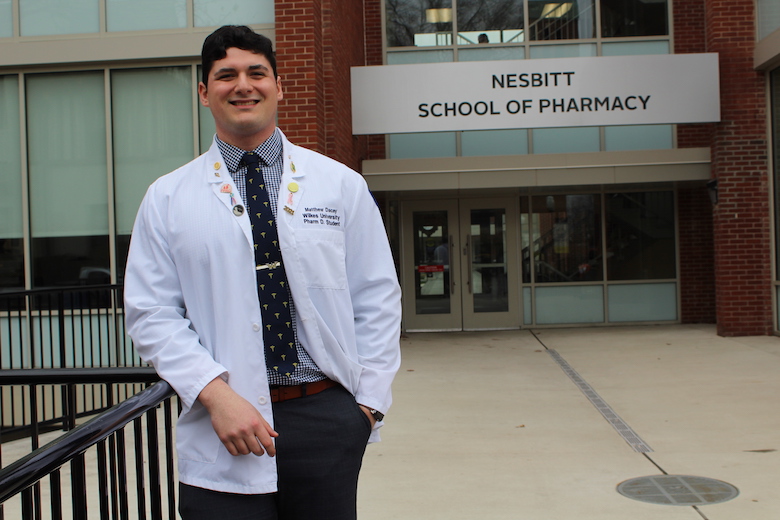Matt Dacey, a resident of Mountain Top, Pa., had two goals when he came to Wilkes: play baseball and earn his doctor of pharmacy degree. During his first two years on campus, he played first base for the Colonels, fulfilling his dream of playing ball on the college level. “It was the best time ever,” Dacey says. Now he’s focusing on the opportunities he’s found in Wilkes University’s Nesbitt School of Pharmacy.
Dacey’s future career as a pharmacist will make him part of a family tradition of working in health care. His grandfather was a physician who practiced medicine for a half-century as an obstetrician/gynecologist. His mother had a career in pharmaceutical sales. Now Dacey, a third-year student pharmacist, is looking forward to making his own contributions.
Studying for his pharmacy degree at Wilkes has exceeded every expectation he had when he was first admitted to the program, Dacey says. He shared ten things you might not know about being a pharmacy student at Wilkes:
- Student pharmacists at Wilkes can have a typical undergraduate experience because those admitted to the Nesbitt School ‘s guaranteed seat program enter Wilkes with other members of the freshman class upon graduation from high school. Like all first-year students, Dacey lived on campus and participated in campus activities.
- Wilkes student pharmacists have another unique opportunity not available at many professional schools: Those who are athletes can continue to play their sport for their first four years at Wilkes if they choose. Dacey played baseball. Wilkes student pharmacists also can be found playing on many of the University’s varsity teams for men and women, including football, soccer, softball and more.
- Nesbitt School faculty are committed to helping their students succeed. While academic standards for admitting students to the program are high and the curriculum is rigorous, “there is a lot of faculty support,” Dacey says. Professors are accessible and get to know their students.
- “I never expected to grow as much as I have personally and professionally,” Dacey says. The emphasis on professionalism and leadership as part of students’ education is second-to-none. “When you come into the pharmacy school, if you are not already a leader, they mold you into that,” Dacey says. He adds that Wilkes students stand out at professional conferences because of the polished and professional way that they present themselves – a standard that is set by Nesbitt School of Pharmacy faculty.
- There are many opportunities within the Nesbitt School to get involved and develop leadership skills. Dacey is president of Wilkes’ chapter of the Student National Pharmaceutical Association, which serves the community through education about health-care issues, vice president of Phi Lambda Sigma, the pharmacy professional association, and pledge educator for Kappa Psi. He also is one of the student representatives on the pharmacy school’s re-accreditation committee.
- Team-based learning is an integral part of the program, Dacey says. “That was something I didn’t expect,” he explains. In the real world of health care, pharmacists work with physicians, nurses and other members of the patient-care team. Students in the Nesbitt School prepare to enter that world and may find themselves working on projects with nursing students from Wilkes’ Passan School of Nursing and with medical school students from Geisinger Commonwealth School of Medicine.
- “I never expected that I would be doing the amount of traveling that I’ve done in pharmacy school,” Dacey says. Students have opportunities to attend regional and national pharmacy conferences for organizations such as the Pennsylvania Pharmacists Association and the American Pharmaceutical Association. At the conferences, students may present research or participate in skills-based competitions. Dacey notes that he has visited North Carolina, Maryland, Connecticut, Rhode Island and Utah through such professional development opportunities.
- Travel to conferences and other activities provides Wilkes student pharmacists with opportunities to network with pharmacists and with students at other pharmacy schools. The connections can be helpful in exploring internships, clinical placements and careers post-graduation. “They can really help you to get a ‘foot in the door’ ” Dacey says.
- Wilkes pharmacy alumni are another valuable resource. They serve as preceptors for student pharmacists at clinical sites, act as mentors and more. Dacey has been able to gain hands-on experience working at Crestwood Pharmacy in his hometown, owned by Wilkes alumnae Sonya Mylet Pharm.D. ’07 and Jessica Orloski, Pharm.D. ’10.
- Opportunities for specialization in the pharmacy profession range from working in a community pharmacy to research to working in fields such as nuclear medicine. As Dacey begins to prepare for his clinical rotations in the 2020-2021 academic year, he is considering working with patients in ambulatory care settings and teaching on the college level as possible career choices. His clinical rotations will help him to get first-hand experience in different specialties. Some pharmacists choose to take post-graduate residency training. At Wilkes, 79 percent of those who sought specialty training were successfully matched to a program – a rate that is 15 percent above the national average.






